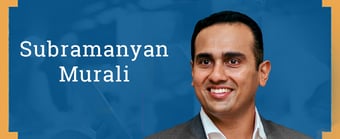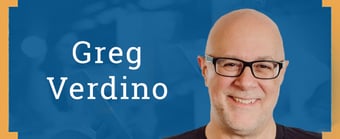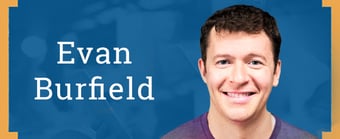| 00:00:00 - 00:02:01 |
Today's guests is the CEO and founder of the Institute for Education, whose mission is to engage the global community to harness the power of data, innovation and self diplomacy in the global community. She's a very unique background. She coach tennis of Georgetown, coach Supreme Court justice, has royalty, she's been labeled as washing DC's networker in chief and she has founded computer science coding camps. She has a ton of energy at a fantastic perspective. Here's coach Cathy Kemper. You're listening to see sweet blueprint, the show for sea sweet leaders. Here we discuss nobodys approaches to organizational readiness and digital transformation. Let's start the show. Hey, coach Kemper, thanks so much for joining me. Hi, George, thank you. Delighted to be here with you. In Our world I always encounter trying to marry up a digital native and a nondigital native and I find that there's a ton of opportunity there and a ton of value when it's done correctly, but also there's a lot of obstacles and frustrations and Egos and theoris and biases. And with you and your foundation, you're right at the intersection of innovation and data and soft diplomacy and and I would imagine that you have so many tremendous stories about connecting those digital natives and non natives, and I'd love to hear a little bit about the mission of your organization and then we can talk a bit about those stories. Okay, great, well, thank you. Well, the mission of the Institute for Education is to harness the power of data, innovation and soft diplomacy in the global community and we've been doing that for about thirty years now. The soft diplomacy is really kind of key because I'm a big believer that collaboration and partnerships are the way people move their companies forward, move themselves forward, move their employees forward and their team and so we create environments that are very safe and nonpartisan, that people can come together in Nice settings and have a meal and discuss whatever... |
| 00:02:02 - 00:04:00 |
...the theme of the the program is, and it can be people that are leaders in that field and major stakeholders, and it can be lay people that are senior in whatever career they have pursued but really maybe are not deep into the subject matter but are there because they want to learn and be educated. You know, and reskill themselves, so to speak. That's such a wonderful mission. And how do you you know with there's a lot of experience in those environments, I would imagine, all coming from different perspectives. How do you how do you make it safe and how do you make sure that those new relationships really can form? When we pull a group together, I take a lot of time curating the group to make sure that the people in the room and at the table, I think that they would be a representative of, you know, their personal mission, but also that there there would be a good mix and that people wouldn't be all people from one sector. I find that people you pull people together that know a lot about different things, it's always good conversation. Nobody can really monopolize the conversation then and when you're just with smart and concerned and Nice people that also have a good sense of humor. I'm a big proponent of having fun and never taking oneself too seriously. I think that's a good recipe. Fun is definitely a great recipe and having that humbleness and not taking yourself seriously definitely helps. You know, when we're introducing those digitally native leaders into these maybe lagguered industries. We do find sometimes that you get that that Silicon Valley chip on the shoulder and they might underestimate. Hey, you're talking to us an executive who's run a successful business for thirty, forty years. They know their industry, but you're talking about threestar general. They know what they're doing. Just because they're not a digital native doesn't mean that they're they're less then. Right. What have you found? kind of stories from the trenches. Is worked to to make that recipe... |
| 00:04:00 - 00:06:01 |
...work well is it's interesting, I think when I think right still, even now, I mean I don't think there's a whole lot of real hardcore digital natives. When I think of a digital native, I think of somebody that well, like your child, is definitely a digital native. I don't think you probably grew up with a cell phone in your hand until maybe you were twelve or fourteen, I don't know. Tell me my wrong. Oh, thank God, it wasn't until after college. Yeah, okay, so technically then you're really not a digital native. So I think most of the people that you know, the millennials, I think, are pretty pretty much digital natives. But the people that are right now running the companies and running governments and industries and things. I don't think any of them are digital natives, but the ones that are successful are interested in learning and reskilling and finding working with with the people that are entrenched in technology and are I often say technology is like a language or a sport. You learn a sport at a young age and you can pick up another sport and your you've confident and you're never intimidated by sport, and the same things as with languages. If you learn languages that you young age, you can pick up another language when you're even an adult or not intimidated by it at all, and so I think technology is the same. I think if you're not a digital native, you have to put in the time that it takes to learn as much as you can and be patient and just know it is really not easy and hang in there and you'll get it and you won't be a digital native, but you'll certainly be able to speak to the people that you need to run your company, because nowadays every company is a technology company, every company's a software company and has leaders. You might not be in the trenches, so to speak, writing the code, but you've got to be able to talk to your engineers and things, your computer sciences. Those are great points, but somehow I... |
| 00:06:01 - 00:08:00 |
...always found that at a cocktail party people weren't as interested that I could program in seven different languages as they were to the people who could speak in seven different languages. They seem to come off a little bit cooler. But you know, don't you think it's changing a little bit, George? Oh, yes, yeah, absolutely, that was a while while ago. Yeah, and so there's that interest in learning, in the ability to bring new things into your organization, and maybe this is now speaking to the coach in you. is but what we see then is these organizations, even if they're willing to, there's a lot of organizational muscle memory that stuck doing things the old way. And then how do you how do you release some of that and and become a new type of an athlete and kind of change the way that you're behaving and adopt these new things into your organization? Yeah, I think that's really a challenge and I think that's a really smart way to look at things, because I think it's it's not easy. I think has a coach. What I would try to do, whether it's coaching you know, a team or if I'm an executive in the C suite, I think you have to make sure that the people around you are all valued and maybe some that have been there for twenty or twenty, five or thirty years that are not quite as eager to jump on the bandwagon. You have to make sure that you share with them how much you appreciate them, how much you value their experience and so that they don't feel extricated from the process and they're not jealous of the new thoughts that they kind of, you know, will buy in and have ownership and eventually then get excited about the new things that are coming on instead of trying to hold on to the old customs, you know, the old procedures. That's great and I think a really great example of putting in place new things within existing systems and organizations. Are are some of the the coding schools and and and all of those that you've been involved with that. |
| 00:08:00 - 00:10:00 |
I'd love to hear a little bit more about that and and what what's been able to make that a success. Well, yeah, the Institute for Education About eight years ago, when it became very clear that kind of algorithms were, you know, the new a rithmetic and kids that were from underrepresented student populations weren't getting the kind of access to laptops and coding and and things that the other kids were. So we founded a computer science free coding camp at the University of Southern California, of a Turby School of Engineering, which works great because the the Turby School of Engineering. Obviously it has all the equipment right there in the building, and so the kids would come to campus and we had all the Ta's, I call them the coaches, that were the graduate students at the engineering school be their coaches and we have a have a great camp director named Professor Jeff Miller. So it's been a huge success. It's been transformational for communities when and for these young kids. They they can come when they're in kindergarten. Now we've had some that I have graduated and are in college and studying computer science, because those are the these are these are the jobs of the future, that the jobs for now and these are going to give kids and their families, their communities great opportunities in the world that, you know, they all live in now and that they will continue to operate in. So I think it's really important that everybody, not you know, just everybody. Think about languages, and now it's thinking about computer languages. You don't have to be the world's best coder or super duper engineer, but you have to kind of know your way around a little bit, just like you have to. It's good to know arithmetic, right. We have, you know, you can add and subtract on your computer and and things, but it's really good to know your timetables. It definitely is,... |
| 00:10:01 - 00:12:01 |
...and I I love the way that you talk about that as being like arithmetic, because it changes the dialog from saying, Hey, these aren't these high level things that we need to elevate everyone to. It's more like, Hey, these are table sticks that we should be getting to everyone, and I love looking at it from that flipped angle and and probably continuing looking at it right like each time there's a new you know, it's Ai, it's V are, it's are they happen in these pockets, but then it does eventually become table stakes that everyone should have access to and be educated on that topic rather than trying to just elevate I love the way that you're looking at that. Yeah, I say it's reading, writing, arithmetic, and Algorithms. Well, it's it's funny. I think the same thing hot you see happen within organizations. They'll spin up, let's say, an innovation lab or a, you know, an analytics and insights group. But what we're really starts to be successful is when it just becomes this isn't just a group over here, this is something that needs to be weaved into the entire organization, becoming just like breathing, you know, breathing drinking water, rather than this this complex thing that that you know, it just seems so far away. Yeah, it's also, I you know, that just makes me think about digital hygiene. You know, people that are not that are not digital natives, oftentimes lay people is that call them. They are afraid of technology and they're afraid of, you know, getting spam or getting hacked and that kind of thing. And I think a big component, whether you're an enterprise or, you know, a kid or just anybody, is teaching people digital hygiene, which is not hard. It's just you have to be aware of it, that bad things can happen if you don't know it, but once you know it it's very easy and you just can't really be sloppy about it. Yeah, and maybe that comes bringing that act to the athlete and then the coach is not being afraid, comes with the knowledge of why things are happening. Right in my golf swing, the worst thing is when I'm hitting it... |
| 00:12:01 - 00:14:03 |
...in a certain way and I just have no idea why that's happening. And because I have no idea why it's happening, then I start tinkering and having a million thoughts in my head as as amm back swing, and then it just explodes into a complete mess, whereas if you can have the the knowledge of the fundamentals, then you can strip away some of that that fear and anxiety. Yeah, exactly. I am curious a little bit of your journey, you know, from from coach to what you've been doing with ifee. What does that transition been like and what are some of the core skill sets that you've seen just be so, so valuable along that journey? You know, I think. I think the core skill set is relationships. I think you have to embrace, you know, people that you find you get along with and make time for them and talk to them and spend, you know, care about them and be interested in what they're doing. And I think or the instant for education started because I had I was teaching a lot of big shots, so to speak, tennis and my husband said, Cathy, you teach all these big shots tennis. Why don't we invite a couple of them to meet some of my colleagues? He's in the finance world, and just talk off the record and exchange ideas and things. And so the first person we had was a secretary of defense. His name was less Aspen, and that really only happened because I was less as tennis coach and also a friend and we enjoyed, you know, each other's companies. So I think really fundamentally it's really about building relationships and that's about building teams. It's all about team work and whether you're a tennis coach or you're a CEO of a huge company, it just pretty much the same. You got to care about what's going on and you have to really care about your team. There's no escaping the fundamentals, Huh, of just passion and relationships and and just those core fundamentals of building teams and valuing those teams. Yeah, I think so well with that journey, as you look at everything that you've accomplished at if I fee and elsewhere. What would you like to to say that you're either... |
| 00:14:03 - 00:16:00 |
...the most proud of that that you've accomplished there? Wow, I haven't thought of that at all. It's good to look back. Yeah, yeah, I guess maybe it's the computer science camp at as see. You know, we've helped over seven thousand kids now learn, you know, either fundamental computer science skills or not. You know, they've gone on to serious computer programming and things. But it's also just I also think it's having a place in a community that is respected and people feel that they can come to that is safe, especially during these very partisan times, and talk about ideas and thoughts and philosophies and be open and honest and not be afraid that you're going to get shut down or dad. I think that's really an important thing for everybody these days now more than ever, and that that's certainly not easy. Yeah, we certainly need a heck of a lot more of that in all of our lives right now, and so the fact that you've been able to accomplish that and impact those those kids lives, that's just going to be exponential impact from this point out. And and further success. So so, coach, I'm so excited. I was so excited to have you on. I really appreciate you coming on and talk on us through some of these stories. Thank you so much. Well, thanks, George, and you guys do great work and keep up the good work, the important work. Absolutely take care, coach. Thank you. Bye Bye. Technology should serve vision, not set it. At intevity we design clear blueprints for organizational readiness and digital transformation that allow companies to chart new past. Then we drive the implementation of those plans with our client partners in service of growth. Find out more at www that intevitycom. You've been listening to see sweet blueprint. If you like what... |
| 00:16:00 - 00:16:14 |
...you've heard, be sure to hit subscribe wherever you get your podcast to make sure you never miss a new episode. And while you're there, we'd love it if you could leave a rating. Just give us however many stars you think you deserve. Until next time,. |


